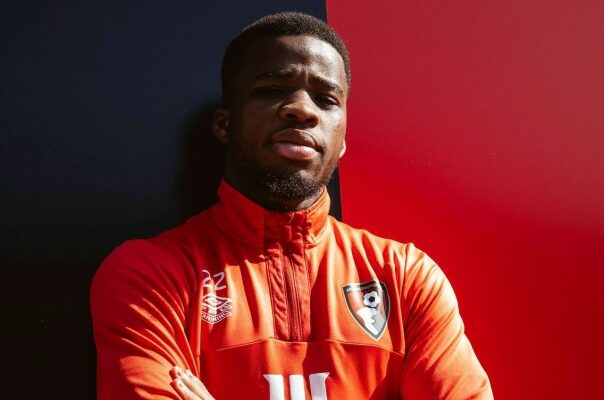In the intricate dance of the summer transfer window, stories of player resurgence often intertwine with club ambitions and fiscal realities. Such is the current narrative surrounding Hamed Junior Traoré, a player who has recently reminded the football world of his capabilities, now finding himself at the center of a classic transfer market impasse between Premier League side Bournemouth and French giants Olympique Lyonnais.
The Resurgence of Hamed Junior Traoré
For a player who has navigated a couple of challenging seasons, Hamed Junior Traoré`s recent loan spell at AJ Auxerre was nothing short of a career revival. The 25-year-old forward, under the guidance of Christophe Pélissier, found his rhythm, contributing significantly to Auxerre`s comfortable survival in Ligue 1. His statistics speak volumes: 10 goals in 26 league appearances – a return that not only showcased his attacking prowess but also highlighted his critical role in his team`s success.
This impressive performance naturally positioned Traoré as a valuable asset. While Auxerre would undoubtedly have relished the opportunity to retain his services, the financial realities of modern football dictated otherwise. Their inability to meet the necessary financial demands meant Traoré`s path would lead him away from the club where he rediscovered his form, back to his parent club, Bournemouth.
Lyon`s Calculated Approach
Enter Olympique Lyonnais. A club with a rich history and a perennial desire to compete at the highest levels, Lyon has been actively navigating the transfer market under what appear to be stringent financial measures. Despite these austerity considerations, the club has not shied away from making moves, exemplified by their recent acquisition of Tyler Morton from Liverpool. This indicates a measured approach, balancing ambition with fiscal prudence.
Their interest in Traoré is logical. A player with proven recent form in Ligue 1, capable of finding the net, represents an attractive proposition. Lyon’s strategy, however, aimed for a loan deal. This approach, often favored by clubs looking to bolster their squad without significant upfront capital outlay, allows for player integration and performance assessment before committing to a permanent transfer. It`s a low-risk, potentially high-reward maneuver in the complex world of football economics.
Bournemouth`s Firm Stance: The Quest for Permanency
Bournemouth, on the other hand, finds itself in a different position. Having seen Traoré`s market value seemingly rebound after his successful loan, the Premier League club is understandably keen to capitalize. Their rejection of Lyon`s loan offer is clear: they prefer a permanent sale. This preference is not merely about recouping an initial investment; it’s a strategic decision. A permanent transfer provides immediate funds that can be reinvested in the squad, frees up salary space, and avoids the cyclical uncertainty of repeated loan arrangements.
From Bournemouth`s perspective, another loan, while perhaps providing a temporary solution for Traoré`s playing time, delays the definitive resolution of his future and potentially foregoes the opportunity to realize his current market value. The club`s reticence to accept anything less than a permanent departure underscores a clear directive to optimize their asset management.
The Classic Transfer Impasse
This situation exemplifies a common, almost theatrical, impasse in the transfer window: the loan vs. permanent deal dilemma. One club seeks temporary reinforcement and minimal risk; the other aims for a clean break and maximum return. It`s a negotiation where each party attempts to dictate terms based on their strategic needs and perceived leverage. Lyon, perhaps with an eye on their budget, is testing the waters with a loan. Bournemouth, having witnessed Traoré`s revitalization, is holding firm for a sale, unwilling to merely facilitate another club`s short-term needs without a significant financial commitment.
The transfer market is a game of poker, where bluffs are called and hands are revealed only as the clock ticks down. This particular standoff is a familiar spectacle, yet always compelling.
What Lies Ahead? The Window`s Unfolding Drama
As the transfer window progresses, the pressure on both clubs will inevitably mount. Will Bournemouth`s demands soften if no permanent buyers emerge? Will Lyon return with an improved offer, or perhaps shift their strategy to include an obligation-to-buy clause? The initial rejection does not necessarily signify the end of the pursuit; often, it`s merely the first volley in a protracted negotiation.
The situation remains fluid. Should Bournemouth adjust their demands or show a willingness to consider another loan under specific conditions, Lyon might indeed re-enter discussions. Conversely, other clubs, having observed Traoré`s successful Auxerre stint, could yet emerge as suitors, further complicating the picture and potentially initiating a bidding war. For Hamed Junior Traoré, the immediate future hinges on this intricate financial and strategic negotiation. His goal-scoring form has put him in demand; now, it`s a question of where, and under what terms, he will continue his rediscovered trajectory.
The tale of Hamed Junior Traoré is a microcosm of the modern transfer market – a blend of player performance, club strategy, financial constraints, and the ever-present element of negotiation. As the summer window draws to a close, all eyes will be on how this particular standoff resolves, and where Traoré will ultimately ply his trade.








